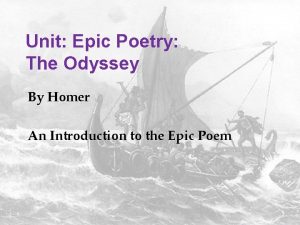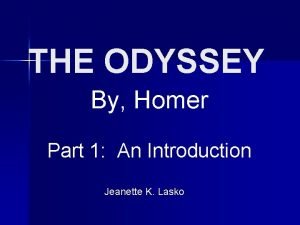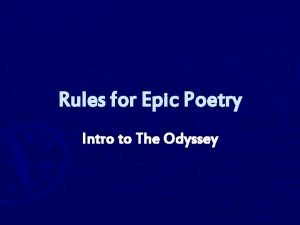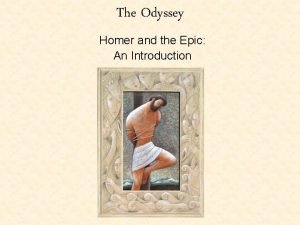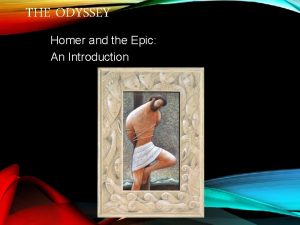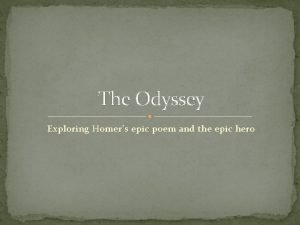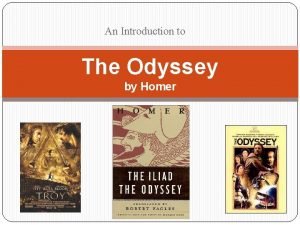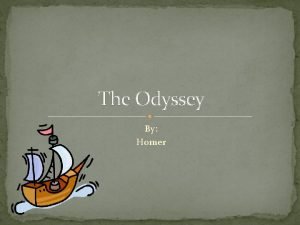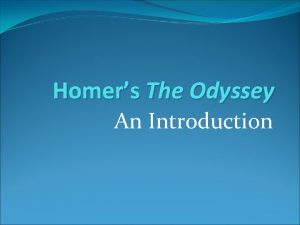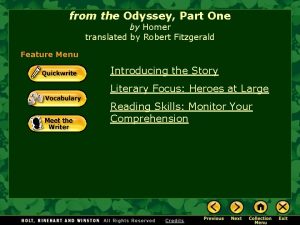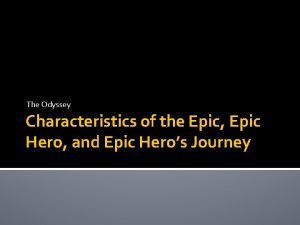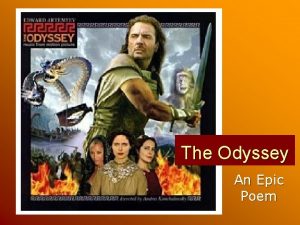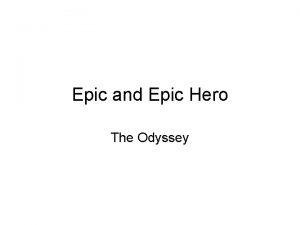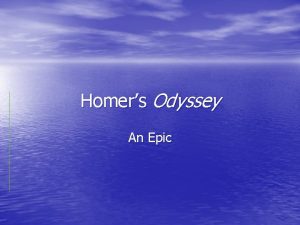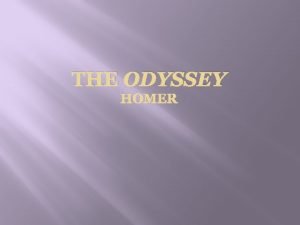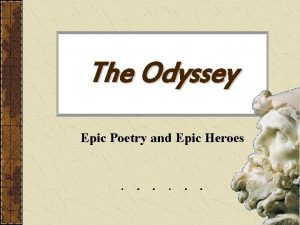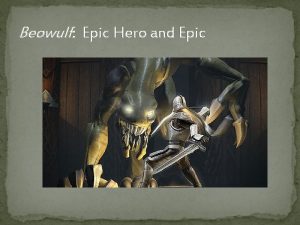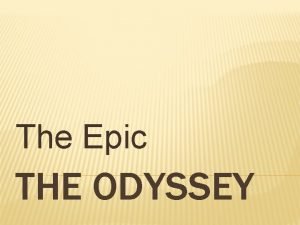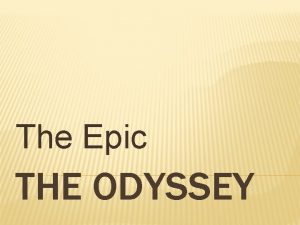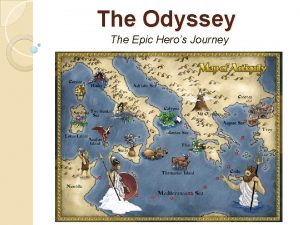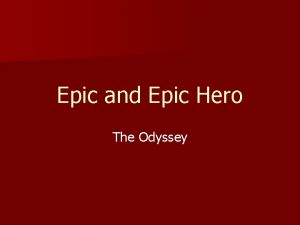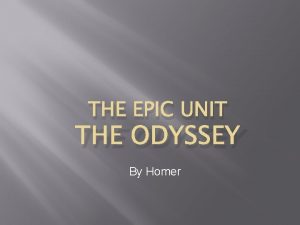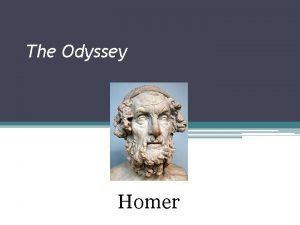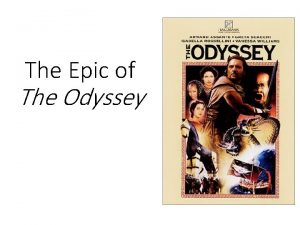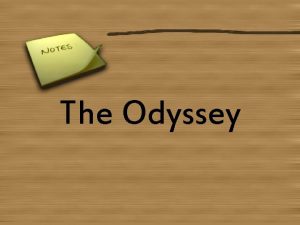The Odyssey Epic Poetry Characteristics of Epic Poetry








































- Slides: 40

The Odyssey Epic Poetry

Characteristics of Epic Poetry • • • The hero is a figure of national importance. The style is formal. The action involves a long and dangerous journey. The setting is large (grand) in size (scale). Epic catalogues used (lists of warriors/places) Supernatural beings and events play a role. Hero has a tragic flaw (hubris) excessive pride The action starts in media res, “in the middle of things, ” rather than at the chronological beginning of the story. Characters are described with short phrases called epithets (raider of cities = Odysseus) Written in parts or sections called books (The Odyssey is composed of 24 books)

The Epic Poet: • is concerned with relaying human values and moral choices. • is considered to be the historian of the people, they bring the past into the present. • is a major form of entertainment.

Characteristics of an Epic Hero Reflect the Values of the Time Period • Kingly—a good leader • Endurance • Eloquent • Manliness • Shows pride in his • Shrewd in battle own reputation • Forceful leader • Love for family and • Feels deeply for the • • • homeland Strength Courage Values the gods • • loss of friends Regards life as precious Generous in return for loyalty

Background of the Trojan War • At the time of the Trojan War, Troy was ruled by King Priam, who was married to Hekuba, who according to legend bore him 49 children. • When Hekuba was pregnant with her son Paris, she had a dream that he would be the cause of the destruction of her city of Troy.

• Therefore, for the sake of the city, Hekuba • decides to abandon her newborn son to death by exposure on Mount Ida. However, Paris is saved by shepherds and grew up as a shepherd, ignorant of his status as a prince. Paris grew up happy and just before the beginning of war, he was grown man.

• Also before the beginning of the Trojan War, Zues falls in love with Thetis. Zeus is known to be a womanizer, however he decides not to sleep with Thetis because it is prophesized that she would give birth to a son who would become greater than his father. • Therefore, to protect his throne, Zues arranges to have Thetis (a goddess) marry Peleus (a mortal). They will be the parents of Achilles. (This makes it possible for the prophecy to come true—Achilles can become greater than Peleus—without harming Zeus’ position as “King” of the gods. )

• All the gods and goddesses were invited to the wedding and were enjoying themselves. • The wedding was going well when suddenly, Eris, the goddess of discord, who was not invited for obvious reasons, got angry. • She decided to cause trouble at the wedding.

• She decided to throw a golden apple into • their midst with the words “For the Fairest” written on it. Of course, all the women at the wedding claimed the apple as their own, but Hera, the first wife of Zeus, Athena, Zeus’ favorite daughter and Aphrodite demanded the apple.

• Each of them • demanded that Zeus choose one of them. He of course wisely refuses. Instead he chooses a shepherd, Paris (who was tending his flock close by) to be the judge.

• Each goddess tried to convince Paris to choose her by offering him rewards. • Each offered him her specialty:

Hera • Hera offered him a rich kingdom and power.

Athena • Athena offered him wisdom and fame in battle.

Aphrodite • Aphrodite offered him love, the love of the most beautiful woman in the world, Helen.

• Paris, of course, chose Aphrodite as the winner of the apple and he in turn made terrible enemies of Hera and Athena (which is why Zeus refused to pick). • Later, they vowed to help Greece defeat Troy, Paris’ homeland, in order to punish him.

• After the “beauty contest”, Paris learned his true birthright, that he was indeed the prince of Troy, the son of King Priam. • First he sailed to Troy to claim his title.

• From Troy, Paris sailed to Sparta, Greece, where he seduced and abducted Helen of Troy, wife of King Menelaus.

• This information is not part of the legend: Helen • • of Troy was angry at her husband, the king, because he has been away from her so long. In addition, Paris is actually a very good looking young man. It was not difficult for Helen to be seduced. There is some question as to whether or not Helen was actually abducted, was put under a spell by the goddess, or went with Paris voluntarily. When King Menelaus, King of Sparta, returned to his home to find his wife gone, he assembles an army to sail to Troy to reclaim his wife.

Backstory on the army: • Being the most beautiful woman in the world, • • many people wanted to marry Helen. When it came time for her to choose, many men wanted to claim her. To ensure peace, all the suitors agreed to accept her choice of a husband—and to support him against anyone who might break the agreement. When she is taken by Paris, all the suitors who wanted to marry her are obligated to support Menelaus in his attempt to get her back.

• Odyseus did not want to go with Menelaus—he • • had moved on and married Penelope and she had just given birth to a son. In order to be let out of his promise, Odysseus pretended to be mad. He took the plow into the field and tore up crops and land by directing the plow in a random order. To show that he was not crazy, the other warriors placed his son in front of the plow. When he moves the plow aside to avoid his son they know he is not crazy and he is required to leave with them.

• Achilles (and his mother) also did not want to • • participate in the battle. In order to avoid going, Achille’s mother disquised him as a woman and him in the woman’s quarters. Odysseus wasn’t about to let anyone else get out of it if he hadn’t so he came up with a plan to trick Achilles. He disguised himself as a merchant and offered the women jewelry and scarves. But he put a few weapons among his wares. Of course Achilles was interested in the weapons so he was found out and made to leave with the warriors.

The Trojan War • Agamemnon was chosen as the leader of the • • Greeks. Troy is a city sacred to Poseidon. He was instrumental in building the wall that surrounds the city protecting it from attack. The army stays outside the city walls but is unable to make it inside. To survive as the war drags on year after year they raid local towns, taking supplies and slaves. After nine years of Achaian attacks (Spartan soldiers), Troy remains in tact.

• A soothsayer reveals to the army that their arrogance has caused the army to do so poorly. There is a legend that the war will not end until two of the Greek leaders disagreed. The disagreement happens in the tenth year of the war. • On a raid, the Greeks make a raid and among other things they take a maiden named Chryseis. She is given to Agamemnon as part of the spoils.

• Unfortunately, her father is a priest for Apollo. He prays for vengeance and Apollo heard his prayer and sends pestilence upon the Greeks. • Achilles blames Agamemnon for their trouble and Agamenon refuses to return the woman who was captured and awarded to him as a “war prize. ”

• The King agrees to return the woman, but as compensation he says that he will take the woman who was awarded to Achilles, his best warrior. • Achilles is furious and refuses to fight any longer. He retires to his tent and refuses to come out.

• When the fighting becomes worse and the • Achaeans realize they are critically suffering defeat, Patroklos (Achilles best friend) talks with Nestor, one of the oldest and wisest of the Achaean soldiers. Nestor asks Patroklos to dress in Achilles’ armor and return to battle. (It is armor made for Achilles by Hephaestus—and easily recognizable as his. ) They believe that if the Trojan Army believes Achilles has returned they will be fearful and it will boost the morale of the Achaians as well.

• However, Patroklos is killed in battle after displaying incredible human valor. • Achilles is so distraught by the death of his warrior companion that he returns to battle and vows to avenge Patroklos’ death.

• During battle, Achilles • kills Hektor. However, his anger is not sated so he ties Hektor’s corpse to his chariot and drags it in circles around Patroklos’ burial mound every day for 9 days. This is a disgrace and the King of Troy begs for the body of his son which he is eventually given.

The Fall of Troy • After the burial of Hektor, the Trojans called on outside forces for help. • In one battle, Achilles encountered Paris, who shot an arrow which, guided by Apollo, struck Achilles in the right heel, the only place he was vulnerable.

Legend of Achilles • Legend has it that Achilles, whose father is a • mortal (Peleus) and his mother (Thetis) is a goddess was dipped in the River Styx by his mother when he was a baby. The River Styx is the body of water that is used to transport the dead to the Underworld, the realm of Hades. This she believed would make him immortal and incapable of being wounded or killed.

• However, when she dipped her son in the river she held him by his heel, in order to not lose him in the river that would take him to the underworld. Therefore, the back of his heel did not get touched by the water from the river, making that the only place that Achilles could be hurt. This was his only vulnerability and aided him in being the fearless warrior he was. (Therefore, when we speak of someone’s vulnerability, we call it their Achilles heel. )

• Achilles is finally defeated when he is wounded in battle—a poisoned arrow strikes him in the heel. The wound is not enough to kill him, but the poison is able to enter his body. He dies from his only weakness—showing that you cannot escape the fate of death no matter how much you try.

The Hero’s Plan to win the war • Eager to end the ten year war and return home, Odysseus conceived of a plan whereby the Greeks could get inside of the walls of Troy. The plan is an example of his cunning and intelligence particularly in battle. (Hence being a favorite of Athena. )

• He instructed the • warriors to build a great horse of wood with a hollow belly that would hold many warriors. In the darkness of the night, the horse was brought to the Trojan gates and the warriors climbed inside.

• Odysseus had primed Sinon, a Greek, with plausible stories about the Greek’s departure, the wooden horse, and his own presence there. • After building the horse, a large group of soldiers hide inside and all the other troops leave. (Hiding nearby but of sight) • When the Trojans see that the beach is empty they tentatively come out to investigate.

• Sinon says that he was left behind because the • the malice of Odysseus. He tells the Trojans that the horse is an offering to Athena made too big to be brought inside the city. He assures them that if they can bring it inside the city they will triumph over the Greeks. A Trojan priest, Laocoon, is sure this is a trick and they should not bring it inside. With the aid of the gods, at just this time, a serpent comes out of the ocean and eats the priest.

• Taking this as an omen, the Trojans bring the horse inside the gates. • Believing they had won the war, the Trojans partied into the night. • Once they were asleep and passed out from the partying, the Greek soldiers crept down out of the horse, killed the sentries and opened the gates to the rest of the Greek army that had returned as planned.

• Troy was devastated and defeated. • Hera and Athena had their revenge on Paris and • • • his city and the prophecy stating Paris would cause the downfall of Troy came true. All of the men make ready with their spoils and return home. Menelaus takes Helen and show up later in the story, apparently completely happy. Agamemnon took Cassandra captive and sets out for home. His eventual fate is described later by his spirit.

Who is Odysseus and The Odyssey • The Odyssey is the story of the greatest Greek hero, Odysseus, and his long journey home.

• After the war ends, he leaves Troy with many ships and the men who man them. They are headed home to Ithaca. • It takes him ten years to get home. His journey and the people, monsters and creatures he meets along the way are the subject of the epic poem The Oddyssey. • His destiny is set by the events of The Illiad, he arrives home without ships, comrades, and under tough times at home.
 The odyssey and epic poetry an introduction part 1
The odyssey and epic poetry an introduction part 1 An introduction to the odyssey by david adams leeming
An introduction to the odyssey by david adams leeming Epic poems definition
Epic poems definition The odyssey and epic poetry: an introduction, part 1
The odyssey and epic poetry: an introduction, part 1 Who was homer
Who was homer The odyssey and epic poetry an introduction part 1 quiz
The odyssey and epic poetry an introduction part 1 quiz Introducing the odyssey
Introducing the odyssey The odyssey and epic poetry an introduction part 1
The odyssey and epic poetry an introduction part 1 The odyssey and epic poetry an introduction part 1
The odyssey and epic poetry an introduction part 1 The odyssey and epic poetry an introduction part 1
The odyssey and epic poetry an introduction part 1 Beowulf hero cycle
Beowulf hero cycle Epic hero define
Epic hero define Why is the odyssey an epic poem
Why is the odyssey an epic poem Shrek epic hero
Shrek epic hero Is odyssey an epic
Is odyssey an epic Homer's first epic is the primary model for the epic of
Homer's first epic is the primary model for the epic of Why do epic heroes have supernatural powers
Why do epic heroes have supernatural powers Hát kết hợp bộ gõ cơ thể
Hát kết hợp bộ gõ cơ thể Slidetodoc
Slidetodoc Bổ thể
Bổ thể Tỉ lệ cơ thể trẻ em
Tỉ lệ cơ thể trẻ em Chó sói
Chó sói Tư thế worms-breton
Tư thế worms-breton Alleluia hat len nguoi oi
Alleluia hat len nguoi oi Môn thể thao bắt đầu bằng từ chạy
Môn thể thao bắt đầu bằng từ chạy Thế nào là hệ số cao nhất
Thế nào là hệ số cao nhất Các châu lục và đại dương trên thế giới
Các châu lục và đại dương trên thế giới Công thức tính thế năng
Công thức tính thế năng Trời xanh đây là của chúng ta thể thơ
Trời xanh đây là của chúng ta thể thơ Mật thư tọa độ 5x5
Mật thư tọa độ 5x5 Phép trừ bù
Phép trừ bù Phản ứng thế ankan
Phản ứng thế ankan Các châu lục và đại dương trên thế giới
Các châu lục và đại dương trên thế giới Thể thơ truyền thống
Thể thơ truyền thống Quá trình desamine hóa có thể tạo ra
Quá trình desamine hóa có thể tạo ra Một số thể thơ truyền thống
Một số thể thơ truyền thống Cái miệng nó xinh thế
Cái miệng nó xinh thế Vẽ hình chiếu vuông góc của vật thể sau
Vẽ hình chiếu vuông góc của vật thể sau Nguyên nhân của sự mỏi cơ sinh 8
Nguyên nhân của sự mỏi cơ sinh 8 đặc điểm cơ thể của người tối cổ
đặc điểm cơ thể của người tối cổ V cc
V cc
